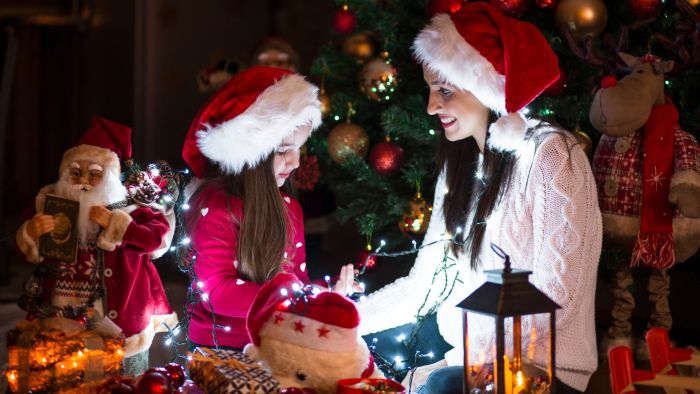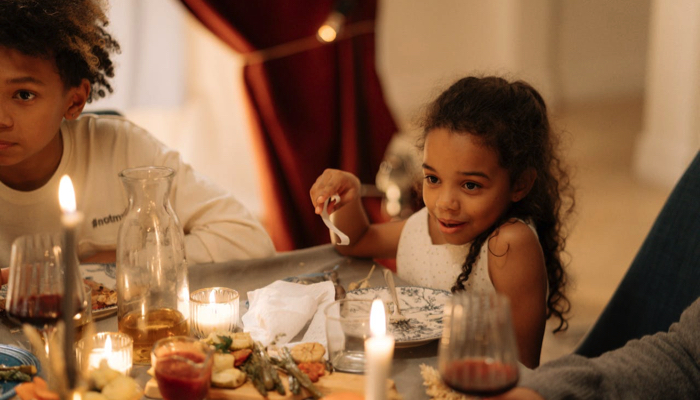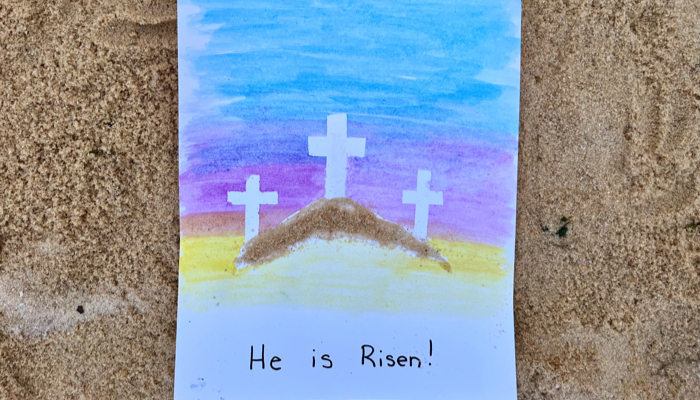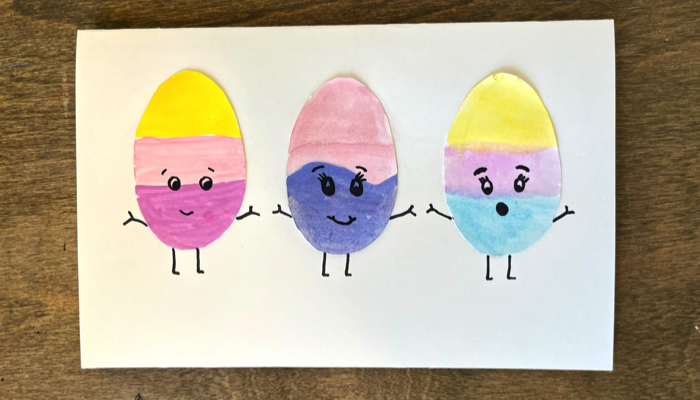Should Parents Lie to Their Kids About Santa Claus?

- Santa Claus is a widely shared story in many cultures, which can put pressure on families to participate in the tradition.
- Pretending Santa is real can benefit your kid’s imagination and creativity, but relying on myths for behavior management can have downsides.
- The moment children stop believing in Santa can evoke mixed feelings, making it important to handle the transition thoughtfully.
- How children react to learning the truth depends on their age, personality, and the way you frame the conversation.
The holidays bring so much magic and joy, but they also come with questions, especially around the topic of Santa. Should parents lie to their kids about Santa Claus?
Some families can’t imagine celebrating Christmas without Santa, but for others—like me—the idea of promoting Santa’s existence feels like a betrayal of the trust they work hard to build with their kids.
It’s easy to feel torn—especially when you’re not in agreement with your spouse or other family members.
We’ll guide you through the different perspectives, weighing the joys of pretend play against the importance of honesty. Whether you decide to embrace the magic or take a more straightforward approach, you can still find a way to make the holidays meaningful and memorable for your family.
Should Parents Lie About Santa?
Deciding whether to tell your kids about Santa—or admit that Santa is a lie—isn’t always straightforward. On one hand, Santa adds to the magic and joy of the Christmas season. On the other, lying to your children, even for the sake of tradition, might raise concerns about honesty and trust.
There’s also the social pressure. You might feel stuck because the Santa story is a shared cultural experience. If the other kids at school believe, you might worry about isolating your child or that they’ll accidentally reveal the truth about Santa’s existence.
Whether you embrace it wholeheartedly or handle it cautiously, there’s no one-size-fits-all answer here. It all comes down to what feels right for your family.
If you’re leaning toward honesty but still want to keep the holiday magic alive, here are a couple of ideas to strike a balance:
- Present Santa as a symbol of generosity and kindness rather than a real person delivering Christmas presents from the North Pole.
- Treat Santa like a fun, imaginative game that the whole family can enjoy together, leaving space to talk openly if your child has questions.
Perspectives and Considerations
There isn’t one right answer to the question of whether parents should lie to their kids about Santa, but you can consider the following perspectives:
Psychological Effects of Believing in Santa Claus on Children
For most kids, believing in Santa isn’t just about unwrapping all the presents on Christmas morning. It’s tied to childhood imagination, storytelling, and even emotional development.

Experts say myths like Santa can fuel creativity and help children learn to think outside the box. Pretending and engaging in stories about Santa can add to the magic of childhood, making the Christmas season feel extra special.
But it’s not all sugarplums and candy canes. Some parents rely on Santa’s “naughty or nice” list to manage their kids’ behavior. While this might work in the short term, child development specialists warn against making changes in behavior all about external rewards. Over time, your kids may focus more on external validation rather than on developing their own sense of right and wrong.
The Debate on Honesty and Trust Between Parents and Children
Another big dilemma many parents face is deciding where to draw the line between harmless fantasy and intentional deception.
Your kids rely on you as a trustworthy source of information about the world, so it’s natural to worry that discovering the Santa myth might make them question other things you’ve said.
But remember: childhood is filled with pretend play—like superheroes, fairies, and imaginary friends. Belief in Santa can be seen as just another part of this magical, playful world.
Many parenting experts say how you handle the truth about Santa’s existence—with sensitivity and open communication—can make all the difference in whether your child feels betrayed or like they’re being let in on a fun secret.
The Impact on Parent-Child Relationships
For most parents, the magic of Santa is an unquestioned holiday tradition. But it’s perfectly normal to wonder how lying about Santa might affect your relationship with your child in the long run.
Trust is the foundation of any healthy parent-child bond. When kids stop believing in Santa, their reaction—and your response—can shape how they view honesty within your relationship.
Some children may laugh it off and say they knew all along. Yours might feel upset, hurt, or even betrayed. If they feel misled, they may begin to question other things you’ve told them.
Every child reacts differently, so how you frame the Santa story matters.
Experts like speech-language pathologist Barbara Dodd and adolescence psychology specialist Esther K. Malm suggest in their 2021 study, Effects of Parenting by Lying in Childhood on Adult Lying, Internalizing Behaviors, and Relationship Quality11. Dodd, B., & Malm, E. K.. Effects of Parenting by Lying in Childhood on Adult Lying, Internalizing Behaviors, and Relationship Quality. Child Psychiatry And Human Development. 2021;54(1), 9–16. https://doi.org/10.1007/s10578-021-01220-8, that while occasional disillusionment is a normal part of growing up, repeated breaches of trust can undermine a child’s confidence in their caregivers.
If you feel conflicted about promoting Santa, consider reframing him as a symbol representing the spirit of generosity and the joy of giving during the Christmas season rather than an actual figure delivering Christmas presents in just one night.
Tips for Maintaining a Healthy Relationship with Your Child
Whether you decide to keep the Santa story alive or be honest from the start, building a strong parent-child bond lies in communication and respect. Here are some tips to help you approach the Santa myth without losing trust or the holiday spirit:
Follow Your Child’s Lead
Kids have a way of letting you know when they’re ready for answers. If your child starts asking persistent questions like, “Is Santa real?” or “Does Santa really live at the North Pole?” it might be time for an honest conversation. Instead of jumping straight to the truth, ask, “What do you think?” This can help you gauge their feelings and guide the conversation naturally.

Frame Santa as a Fun Tradition
If you want to keep the magic alive without compromising honesty, try reframing Santa as a playful holiday tradition rather than a real figure.
This lets your child enjoy the wonder and excitement of Christmas morning while understanding that Santa represents the spirit of giving and isn’t an actual person delivering all the presents.
Be Honest with Compassion
When the time comes to talk about Santa’s existence, a simple, thoughtful explanation like, “Santa is part of the magic we create to make Christmas day feel extra special,” can help your child see the story as something rooted in love rather than a lie.
Reinforce Trust Through Other Actions
If your child feels upset or even betrayed, don’t panic—this is a chance to show them that trust goes beyond believing in Santa.
Be consistent and honest in other aspects of your relationship. Open, age-appropriate conversations about life events or tough topics will help your kids see you as a reliable source of truth.
Encourage Open Dialogue
Whether your child is sad, confused, or relieved after learning the truth, give them space to express their feelings. Listening without judgment or dismissing their emotions will help them know their feelings are valid, reinforcing a sense of understanding and strengthening your bond.
Celebrate the Transition
When your kids stop believing, celebrate this new stage. One way is to ask them to help you keep the magic of Santa alive for younger siblings or cousins. This reframes the experience as a positive rite of passage rather than a loss of childhood magic.
Alternatives to Lying About Santa Claus
It’s okay if you’re uncomfortable promoting Santa’s existence. To still bring magic to the Christmas season without leaning on the Santa myth, here are some alternatives:
Focus on Family Traditions

Shift the excitement away from Santa-centered activities and toward family traditions that are all about togetherness. Decorating the tree, baking cookies, making homemade ornaments, or watching holiday movies together can be just as magical as waiting for Santa on Christmas Eve.
Involve Children in Gift-Giving
Help your kids experience the joy of giving. Let them pick out or make gifts for family members and friends or even participate in donating toys to children in need.
This teaches them that the Christmas season is about kindness and generosity—not just all the presents under the tree.
Introduce Santa as a Story or Symbol
If you’d still like to include Santa in your celebrations, consider reframing him as a fictional character tied to a fun story or belief in generosity.
You might say, “Santa is part of a fun story people share when they celebrate Christmas, and he represents the joy of giving.” This keeps the magic alive without presenting Santa as real.
Ways to Capture the Spirit of Christmas Without Santa Claus
Christmas is about so much more than Santa, and most children eventually stop believing in him.
Whether you’ve chosen not to include Santa Claus in your celebrations or your kids no longer believe the Santa lie, there are countless ways to create a magical Christmas season without relying on Santa’s existence:
Advent Calendar: Use an advent calendar to build anticipation throughout December. You can fill them with chocolates, small gifts, or even family activities to make each day leading up to Christmas day feel special.
Traditions: Old or new traditions can make the holidays more meaningful. Whether you bake cookies, read holiday stories, or have a family movie night, these rituals can become the favorite memories your kids will look forward to every year.
Acts of Kindness: Encourage your children to spread kindness during the holidays. They could write cards for neighbors, leave treats for delivery drivers, or donate old toys.
Celebrating the Christmas Season in a Way That Fits Your Family
Deciding whether to tell children about Santa truthfully or keep the Santa story alive is a deeply personal choice for every family. Whether you embrace Santa Claus as a fictional character or focus on alternative traditions, the goal is to celebrate the holidays in a way that feels meaningful to your family.
After all, the heart of Christmas isn’t about whether Santa is real but about the love, generosity, and connection we share during this time.
Ultimately, there’s no wrong way to approach this as long as your choices come from a place of care and respect for your child’s emotions and development.
Reference
- Dodd, B., & Malm, E. K. (2021). Effects of Parenting by Lying in Childhood on Adult Lying, Internalizing Behaviors, and Relationship Quality. Child Psychiatry And Human Development, 54(1), 9–16. https://doi.org/10.1007/s10578-021-01220-8

Related Posts

Holiday Crafts and Ideas, Special Needs
5 Tips for a Peaceful Thanksgiving with Your Child with Disabilities
Thanksgiving can be a joyful yet overwhelming holiday, especially for families with children who have sensory, motor, or dietary needs.

Holiday Crafts and Ideas
Resurrection Water Color Craft
Celebrate Easter with this Resurrection Water Color Craft, perfect for little ones. They’ll love painting the beautiful sky and adding sand to finish it off.

Holiday Crafts and Ideas
Easter Egg Greeting Card Craft
Turn your child’s painting into an adorable Easter Egg Greeting Card Craft. With just a few supplies, you can create this fun surprise to send to friends and family.